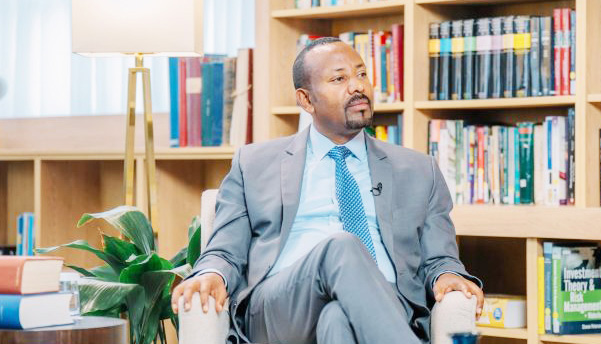
ADDIS ABABA – Ethiopia is witnessing a broad-based economic revival, driven by multi-sectoral reforms and strategic policy interventions, Prime Minister Abiy Ahmed (PhD) said in a televised interview on Thursday.
Highlighting tangible improvements across key sectors, the Premier underscored that the country’s homegrown economic reform agenda is yielding measurable outcomes like reduced inflation and rising exports to industrial expansion and improved service delivery.
“Ethiopia is recovering from its past ailments and is now on a path to renewal,” he said, attributing the progress to inclusive reform measures and a collective national effort.
One of the standout achievements is a sharp drop in inflation from 34 percent to 13.5 percent largely due to targeted macroeconomic initiatives. The Premier acknowledged persistent structural challenges and external shocks but said sustained policy actions are stabilizing the cost of living and restoring economic confidence.
On the export front, the Prime Minister revealed a striking leap in foreign exchange earnings. While the country earned a total of $7.5 billion from exports between the 1992 and 2006 Ethiopian fiscal years, it is now projected to generate over 8 billion USD in the current year alone.
The Prime Minister highlighted structural reforms aimed at strengthening productivity and economic resilience.
A diversified development strategy that prioritizes agriculture, industry, mining, tourism, and ICT has driven the reform momentum, he noted.
“We have shifted from a sector-dependent economy to a multi-pronged growth strategy,” Abiy said. “This approach is already bearing fruit.”
The industrial sector, for instance, has seen significant progress. Industrial production capacity has surged from 48 percent to 65 percent, and the number of operational industrial parks has grown from three to thirteen. A 13 percent growth is projected for the industrial sector in the 2024/2025 fiscal year.
Emphasizing the distinct nature of Ethiopia’s reform model, the Prime Minister said the program is rooted in local realities but also informed by global best practices.
He rejected claims that the reform blueprint is borrowed, stressing it was designed through national reflection and broad consultation.
“Ethiopia’s homegrown economic reform does not mean we are closed off from learning from others,” he said. “It is a contextualized model, not a copy-paste.”
The ongoing debt restructuring talks with international partners, including the IMF and World Bank, are part of a broader effort to ease fiscal pressures and ensure a sustainable economic environment.
The Premier concluded by calling on all citizens, institutions, and development partners to stay engaged in building a resilient and self-reliant Ethiopia. He reiterated that the success of ongoing reforms depends on collective effort and a long-term commitment to national transformation.
“It is the shared responsibility of all stakeholders to safeguard and advance the change we have brought about,” he said.
BY STAFF REPORTER
THE ETHIOPIAN HERALD SATURDAY 7 JUNE 2025




